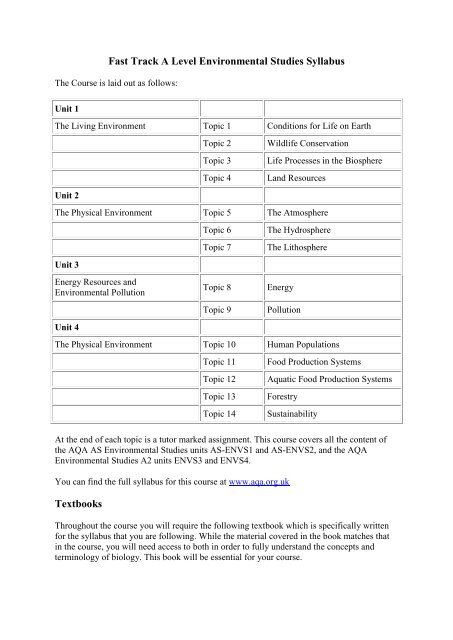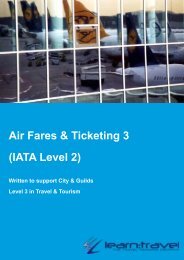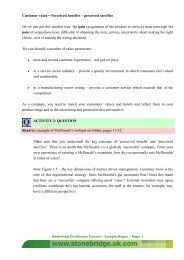Fast Track A Level Environmental Studies Syllabus ... - E - Learn
Fast Track A Level Environmental Studies Syllabus ... - E - Learn
Fast Track A Level Environmental Studies Syllabus ... - E - Learn
Create successful ePaper yourself
Turn your PDF publications into a flip-book with our unique Google optimized e-Paper software.
<strong>Fast</strong> <strong>Track</strong> A <strong>Level</strong> <strong>Environmental</strong> <strong>Studies</strong> <strong>Syllabus</strong><br />
The Course is laid out as follows:<br />
Unit 1<br />
The Living Environment Topic 1 Conditions for Life on Earth<br />
Unit 2<br />
Topic 2 Wildlife Conservation<br />
Topic 3 Life Processes in the Biosphere<br />
Topic 4 Land Resources<br />
The Physical Environment Topic 5 The Atmosphere<br />
Unit 3<br />
Energy Resources and<br />
<strong>Environmental</strong> Pollution<br />
Unit 4<br />
Topic 6 The Hydrosphere<br />
Topic 7 The Lithosphere<br />
Topic 8 Energy<br />
Topic 9 Pollution<br />
The Physical Environment Topic 10 Human Populations<br />
Topic 11 Food Production Systems<br />
Topic 12 Aquatic Food Production Systems<br />
Topic 13 Forestry<br />
Topic 14 Sustainability<br />
At the end of each topic is a tutor marked assignment. This course covers all the content of<br />
the AQA AS <strong>Environmental</strong> <strong>Studies</strong> units AS-ENVS1 and AS-ENVS2, and the AQA<br />
<strong>Environmental</strong> <strong>Studies</strong> A2 units ENVS3 and ENVS4.<br />
You can find the full syllabus for this course at www.aqa.org.uk<br />
Textbooks<br />
Throughout the course you will require the following textbook which is specifically written<br />
for the syllabus that you are following. While the material covered in the book matches that<br />
in the course, you will need access to both in order to fully understand the concepts and<br />
terminology of biology. This book will be essential for your course.
AQA A <strong>Level</strong> <strong>Environmental</strong> <strong>Studies</strong> Student book by Richard Genn (2008) Published by<br />
Nelson Thornes ISBN-10: 1408513900 ISBN-13: 978-1408513903<br />
The A2 material follows on directly from the AS material. The course assumes that you have<br />
some knowledge of science of a level that you might have gained from a GCSE course in<br />
science subjects or of Geography.<br />
Prior Knowledge<br />
This course builds from the knowledge gained in a range of GCSE science subjects, including<br />
GCSE <strong>Environmental</strong> <strong>Studies</strong>, although its study is not essential to undertake the A <strong>Level</strong><br />
course. Some knowledge of biology or other GCSE Science subjects or Geography would be<br />
useful, so you may find the following books useful for revision.<br />
AQA Science GCSE Science Students Book by Ann Fullick, Patrick Fullick, J Breithaupt,<br />
Lawrie Ryan (2006) Published by Nelson Thornes ISBN-10: 0748796347 ISBN-13: 978-<br />
0748796342<br />
Understanding GCSE Geography: For AQA Specification A (Understanding GCSE<br />
Geography) by Ann Bowen and John Pallister (2006) Published by Heinemann Educational<br />
Publishers; 3Rev Ed edition ISBN-10: 0435351710 ISBN-13: 978-0435351717<br />
Practical Work<br />
Students are not required to submit an internally assessed environmental studies<br />
investigation. However, it is expected that candidates should carry out investigative activities,<br />
appropriate to the study of a range of environmental systems and the way in which they<br />
influence and affect each other. They should carry out extensive, appropriate practical work<br />
wherever possible, out in the environment. Integral to each unit is the development and use of<br />
practical skills relevant to the study of the environment; such as the planning and carrying out<br />
of investigations, the interpretation of data and the comprehension of relevant environmental<br />
texts.<br />
The Examination<br />
The AS examination consists of two components:<br />
Unit 1 – ENVS1 The Living Environment<br />
Written unit 1 hour 60 marks<br />
40% of the total AS marks and 20% of the total A <strong>Level</strong> marks<br />
This unit comprises five short answer questions (45 marks) and one structured question (15<br />
marks).<br />
All questions are compulsory.<br />
Unit 2 – ENVS2 The Physical Environment<br />
Written unit 1½ hours 90 marks<br />
60% of the total AS marks and 30% of the total A <strong>Level</strong> marks
This unit comprises eight short answer questions (75 marks) and one structured question<br />
including extended prose (15 marks).<br />
All questions are compulsory.<br />
Unit 3 – ENVS3 Energy Resources and <strong>Environmental</strong> Pollution<br />
Written unit 1½ hours 80 marks<br />
25% of the total A <strong>Level</strong> mark<br />
This unit comprises seven compulsory short answer/structured/comprehension questions (60<br />
marks) and one essay from a choice of three titles (20 marks). Includes synoptic assessment.<br />
Unit 4 – ENVS4 Biological Resources and Sustainability<br />
Written unit 2 hours 80 marks<br />
25% of the total A <strong>Level</strong> mark<br />
This unit comprises five compulsory short answer/structured/comprehension questions (45<br />
marks), one compulsory data analysis question (15 marks) and one essay from a choice of<br />
three titles (20 marks). Includes synoptic assessment.<br />
Please note that synoptic questions will assess AS as well as A2 material.<br />
To achieve a good overall grade it is necessary to do well in all of the components of the<br />
course.




